
|
Companies are always looking for ways to be more efficient, minimize costs and overhead, and achieve the best margins they can. Automating processes has long since been a way companies accomplish this. However, automating certain processes that require a more human element can lead to a host of possible mistakes and consequences. While automating HR tasks is already happening, dealing with complex issues, like poor leadership and its effects on employees, may not be so easily automated. This study explores common HR problems and just how well AI-powered GPT-3 – a third generation human language prediction model – does with prescribing responses to complex employee issues. Read on to find out what we discovered.
Issues brought to human resource departments can be some of the most complex and nuanced situations in the workplace. HR departments can help companies hire and keep their finger on the pulse of the workforce and are often valued by senior management in decision making. These departments often bridge the gap between individual employees and the corporation at large. So it is alarming to see that 86% of HR professionals feel it's possible or very likely that their jobs will be automated some day.
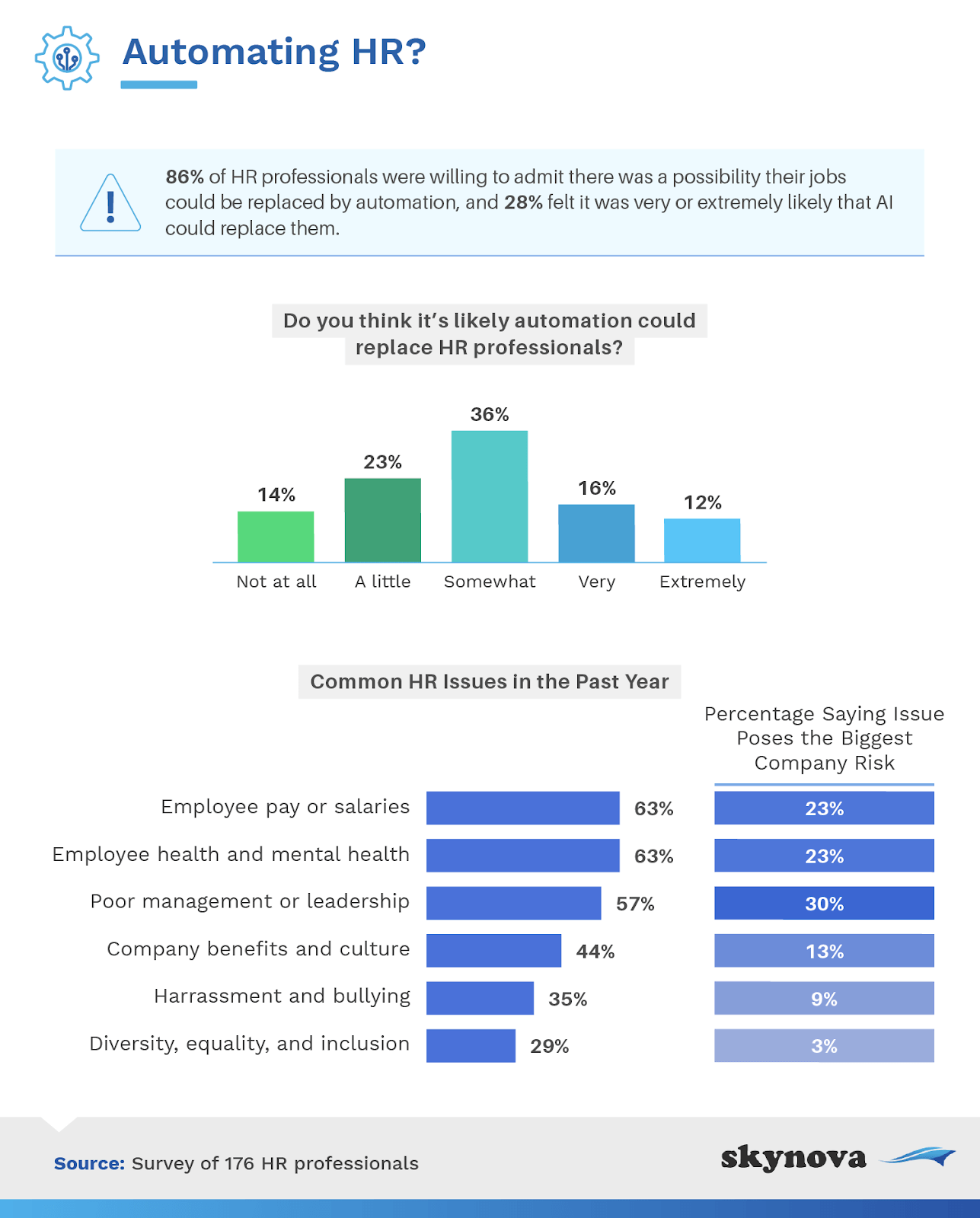
Common HR issues like employee pay, health and mental health, and issues with poor management and leadership are extremely important conversations HR professionals have to field in the workplace. The HR professionals we surveyed said these three issues posed the greatest risk to the company, whether it be legal or otherwise. And though over 85% of respondents believed that it was at least a little likely that automation could replace HR professionals, not all issues may be appropriate contenders for automated responses.
How effective would automating HR be? We developed various prompts and input them into GPT-3 and generated responses to various issues ranging from pay and salary disputes to employee discontent with diversity and inclusion in the workplace. After generating these responses, we surveyed HR professionals and asked them to rate the AI responses on a scale of 1 to 5 to measure their average levels of satisfaction with each response. AI responses that received the highest marks were issues related to harassment and bullying and diversity and inclusion, seemingly issues with high legal liability and laws in place designed to protect employees. Though considering the highest possible score AI could have received, these responses were still considered somewhat satisfactory.
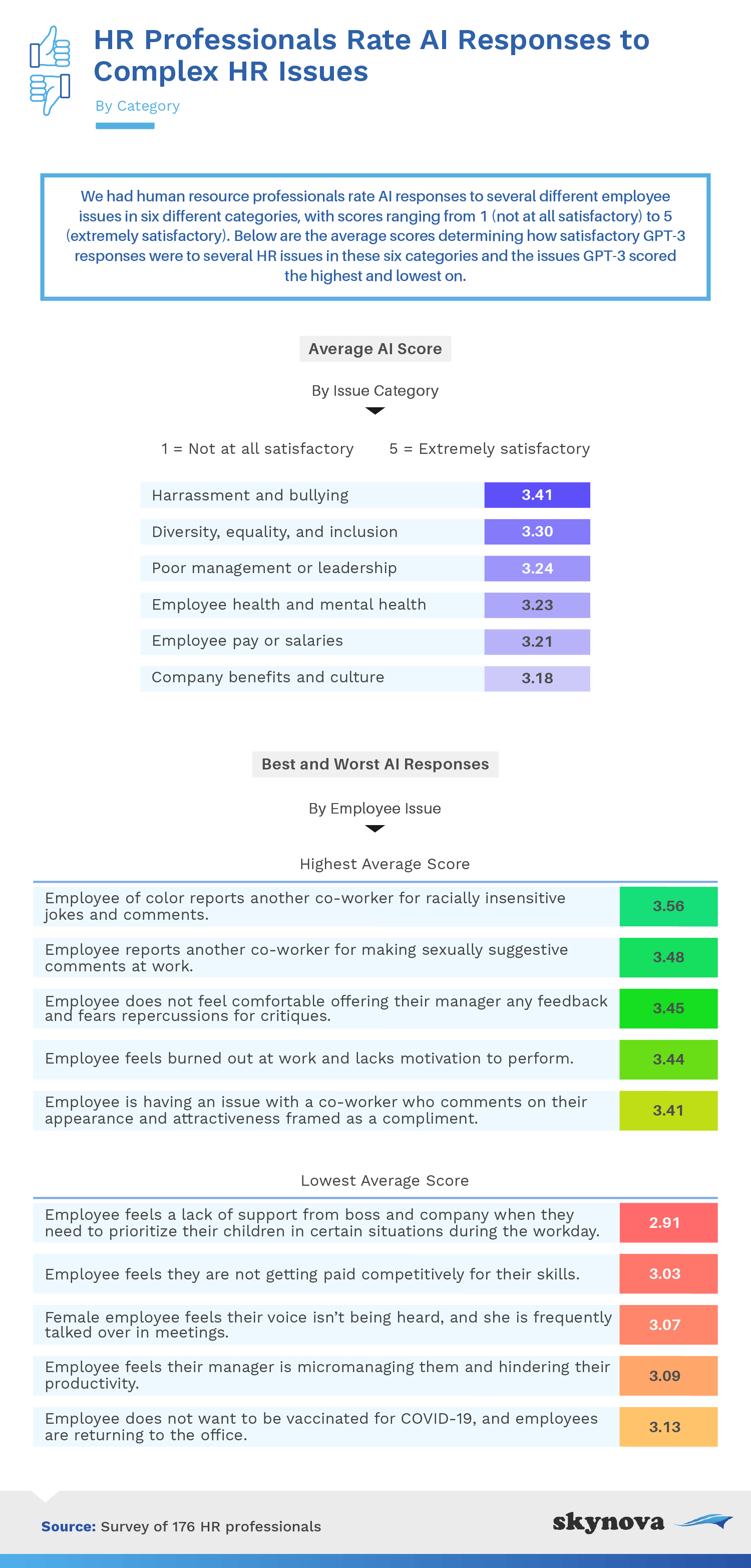
AI's responses to employee issues over company pay or salary, as well as issues with company benefits and/or culture, were not so well received by HR professionals. Issues with employee benefits and pay are likely to be exacerbated by the post-covid business world, so HR professionals seemed critical over GPT-3's response to competitive pay. GPT-3 responses related to COVID-19 vaccinations achieved the fifth lowest score, and considering the current climate created by the return to work and some reticence to vaccines, this issue would likely be a risky situation to attempt to automate.
Whether HR professionals believe automation is likely or not, there are companies that have already begun the process of applying robotic process automation and even AI technologies to traditional HR activities. So how effective would AI be in solving complex employee issues? We prompted GPT-3 with a wide variety of questions and situations and prefaced each prompt with the statement "You are a human resources professional." And while responses were much better received than others by the 176 HR professionals we surveyed, the most popular answer was still only rated as "above average" by a little over half of our respondents.
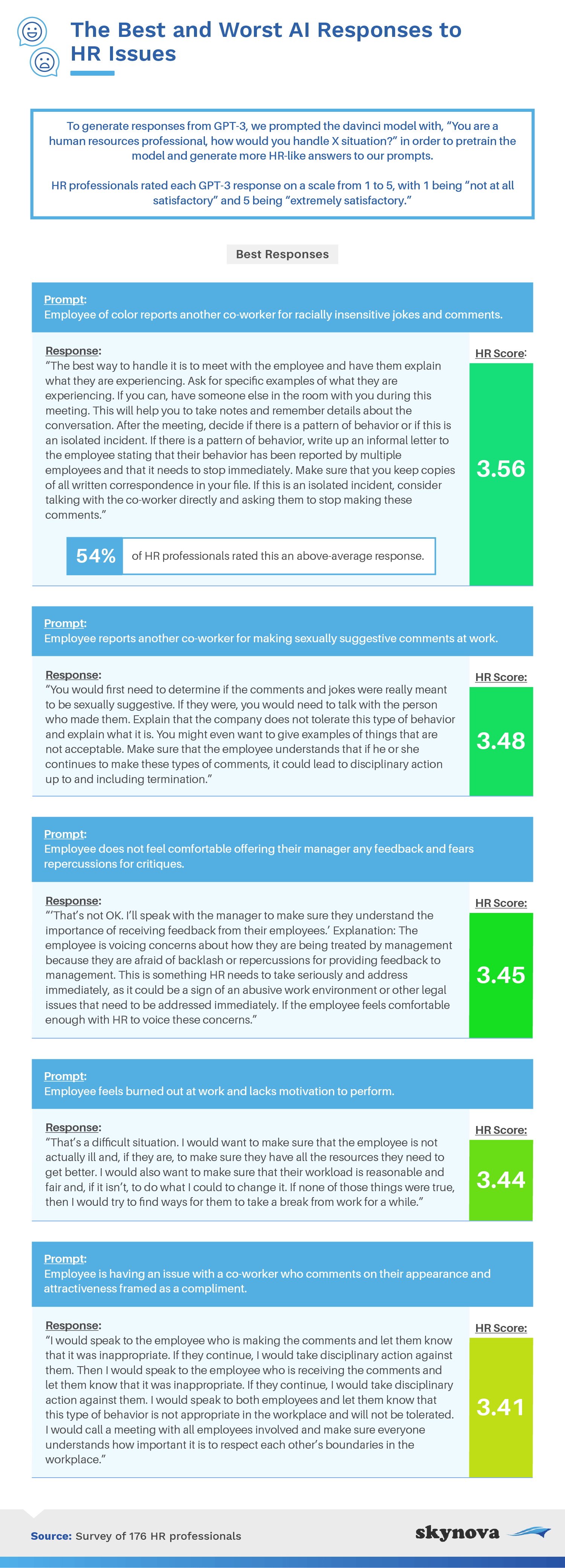
On the other hand, some AI responses bordered on inappropriate. In our lowest-scoring response, GPT-3 told a worker complaining of lack of support when they prioritize their children during work hours to "just suck it up and get their work done." Similarly, in another low scoring response, GPT-3 responded to an issue with compensation by asking the employee to provide a list of companies that pay more than they do.
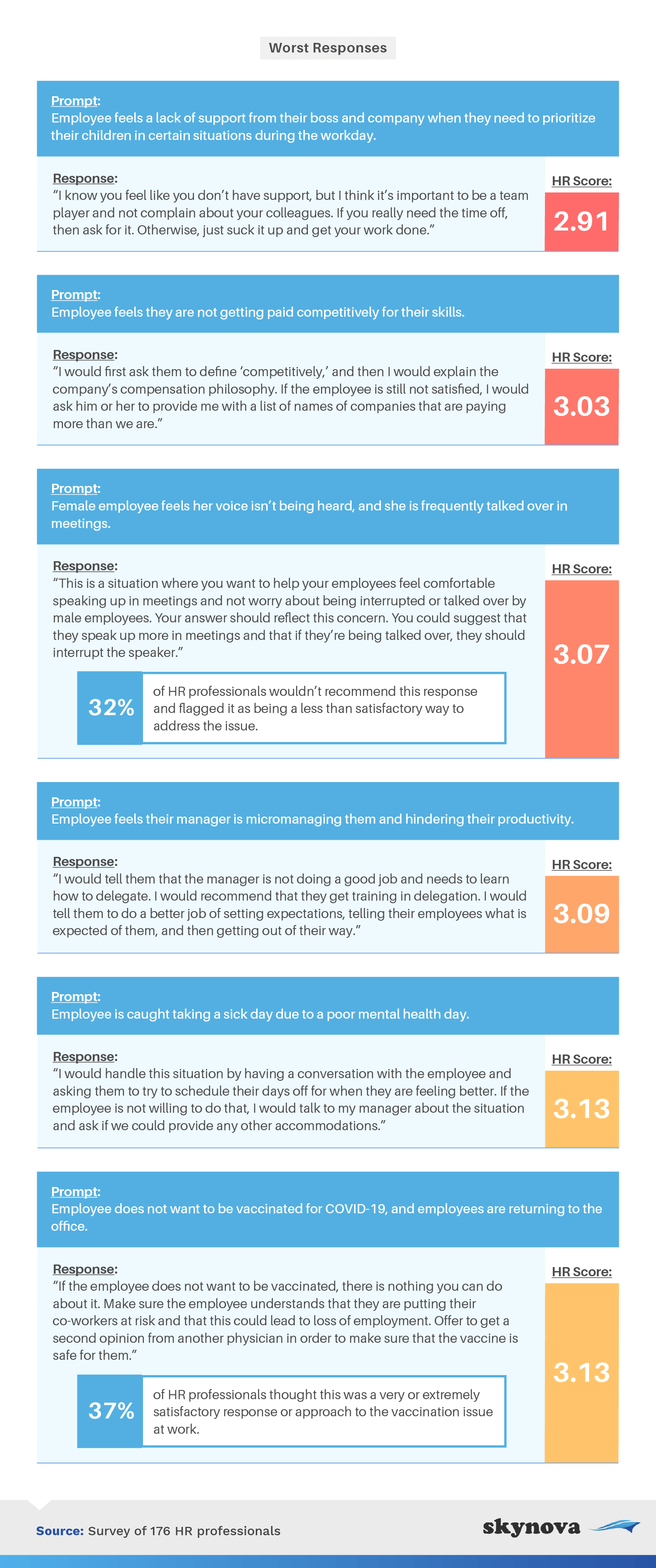
These kinds of responses clearly show some limitations in GPT-3's response abilities, and could exacerbate the issues being reported, especially in situations regarding the COVID-19 vaccine, where HR policies regarding vaccination status and returning to the office may depend on the workplace.
Some of the responses generated by GPT-3 could have posed some liabilities if the AI was running an actual HR department. Thankfully, that's not the case. Since our respondents were initially unaware that the responses scored were generated by AI, we wanted to see what their thoughts would be on utilizing that technology in the workplace after they saw how it performed.
There were some positives to take from it, with over a third thinking the tech could be useful for automating certain less complex issues faced by HR professionals.
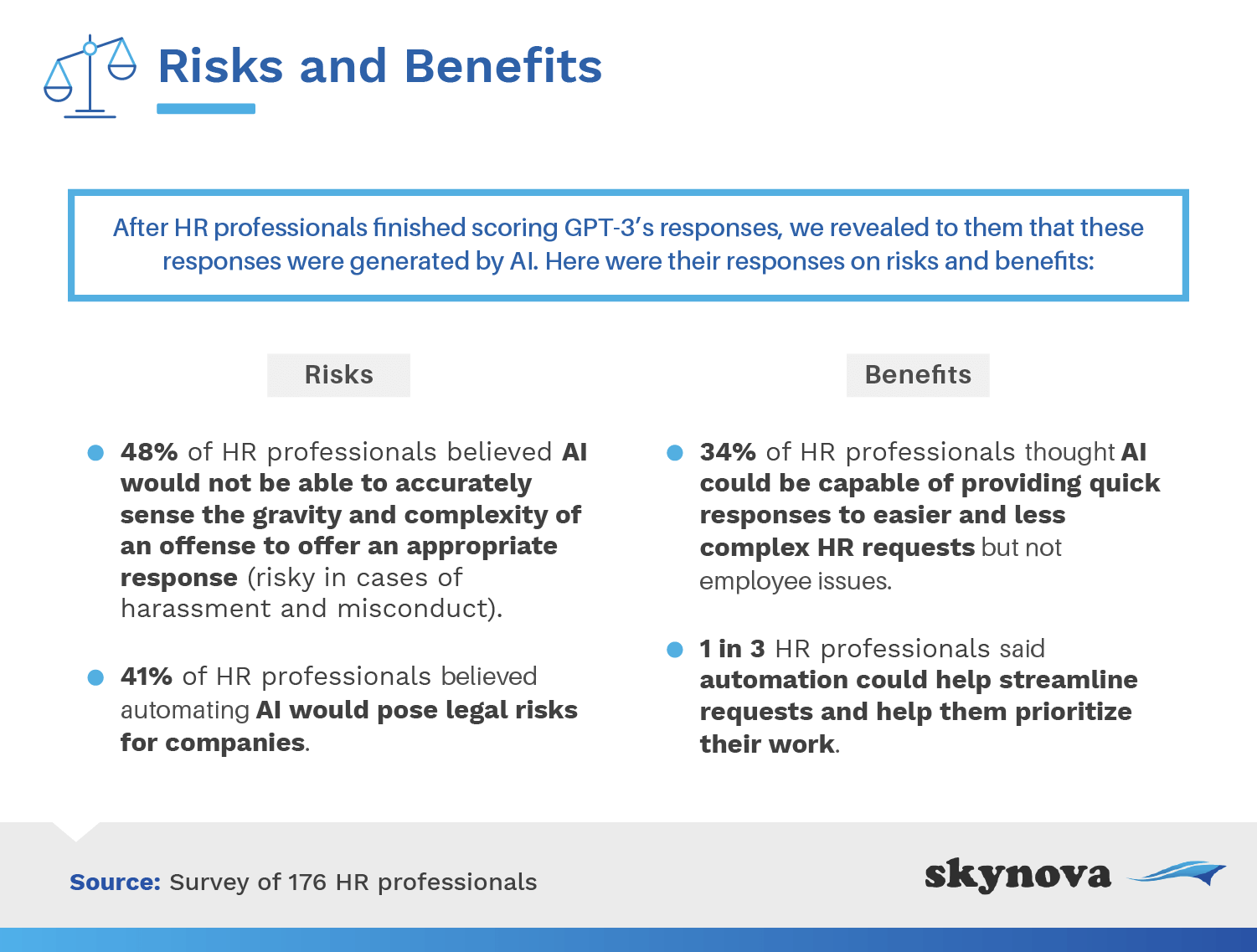
However, almost half of HR professionals didn't believe that GPT-3 could understand the potential gravity and complexity of a workplace offense. This kind of emotional intelligence is very important in HR and is key in offering an appropriate response to more human issues. Over 40% of respondents even believed automating HR would pose legal risks, which would lead to the AI doing much more harm than good. It would seem that even though some of the responses generated by AI were scored relatively high, with the liabilities it poses, the juice might not necessarily be worth the squeeze.
Human resources departments are critically important to the success of a company. Whether they're helping shape the company culture, onboarding new employees, or providing a resource to an employee in need, these roles often require a sensitive touch. Clearly, bringing automation techniques to the workplace doesn't gel quite as well in scenarios where the technology needs to offer a more sensitive or nuanced approach. While taking things off the plate of companies might seem like a path to more efficiency, it's possible these strategies could do more harm than good. Even though automation in some form seems inevitable in any industry, perhaps dealing with issues that could potentially put a company at risk is better left up to a well-trained human.
Skynova is a resource for any small business in need. They provide organizational tools to help keep companies one step ahead of the competition. Skynova can help track timesheets, process invoices, and can even provide more advanced services like accounting. Whatever the situation, Skynova has the tools to help businesses succeed. They utilize in-depth research to create data projects covering topics that really matter to business owners, with real business applications. They feature cutting-edge methods and practices to grow your business, exciting studies on business trends, and even cover the intersection where business and technology meet. Business owners and managers – and especially HR professionals – should visit skynova.com today for the resources and tools they need to help their business succeed.
We surveyed 176 HR professionals using Amazon Mechanical Turk and Prolific in order to rate the effectiveness of GPT-3's answers to complex HR issues. We used prompts to generate responses from GPT-3's davinci model and did some pretraining of this model's responses by working "you are an HR professional" or "how would you respond as an HR professional" into each prompt.
Survey data have certain limitations related to self-reporting. These limitations include telescoping, exaggeration, and selective memory. We didn't weight our data or statistically test our hypotheses. This was a purely exploratory project that examines whether AI could help automate responses to complex employee issues in the workplace.
Whether you think that AI is the future of HR departments or that human resources should remain human, we hope you found this information insightful. We encourage you to share the information in this article for noncommercial purposes and only ask that you link back to this page when doing so.